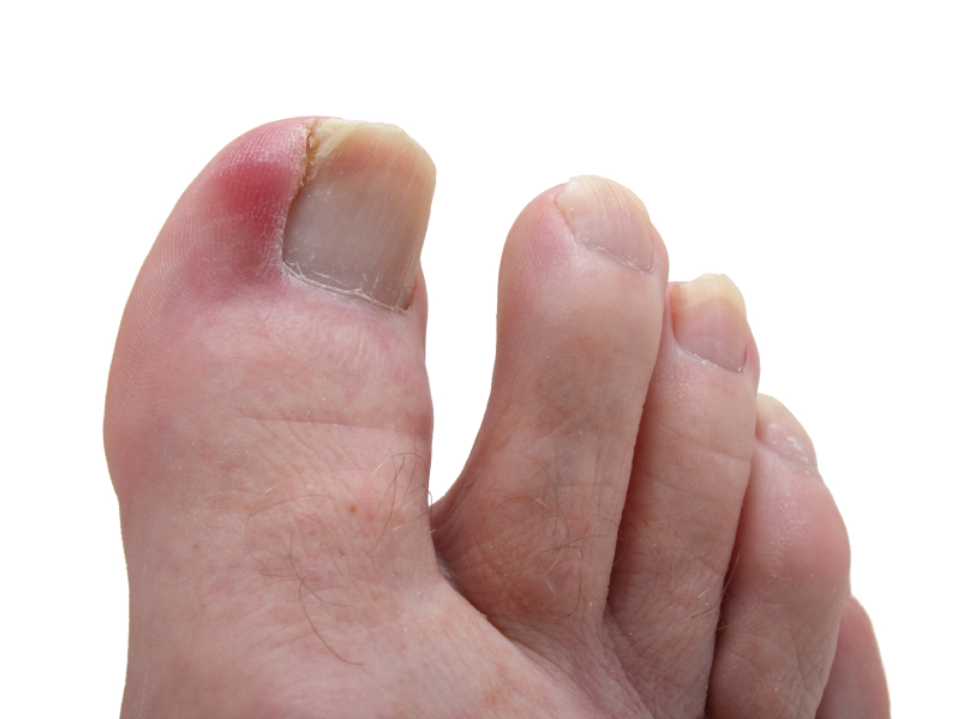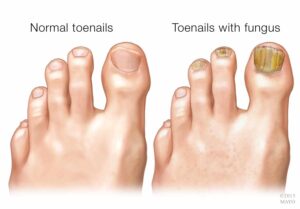Treatment in Jacksonville
Are you suffering for a toenail fungus infection? Laser toenail fungus treatment in Jacksonville, FL is the solution for you. Here in our office, our specialized foot doctors will help treat the stubborn toenail fungus infection. They will consult you and let you know the best treatment option for you.
Common toenail fungus symptoms
Toenail fungus often begins as a small white or yellow spot under the nail tip. Over time, the infection can spread deeper into the nail. The nail may become discolored, turning yellow, brown, or even black. As the fungus grows, the nail can thicken and become brittle or crumbly.
Many people notice the nail becoming distorted in shape or lifting away from the nail bed. The affected area may also develop a foul odor. In some cases, the surrounding skin becomes red, irritated, or slightly painful. If left untreated, the fungus can spread to other toenails or even fingernails. It can also spread to your family and friends.
In advanced cases, toenail fungus can cause significant discomfort and make walking or wearing shoes painful. The nail may split or completely detach from the nail bed. Some people also experience itching or mild swelling around the infected toe. These symptoms can worsen over time if the infection is not properly treated.

Tips to avoid a toenail fungus infection
To avoid toenail fungus, keep your feet clean and dry at all times. Wash them daily with soap and water. Make sure to dry your feet thoroughly, especially between the toes. Moist environments encourage fungal growth and infection. Wear clean socks every day and change them if they become damp or sweaty.
Choose shoes that allow your feet to breathe and fit properly. Avoid walking barefoot in public showers, locker rooms, or pool areas. Let your shoes air out between uses to prevent moisture buildup. Consider using antifungal foot powders or sprays for extra protection. Avoid sharing shoes, socks, or towels with others to reduce the risk of spreading fungus. Strengthening your toenails through proper hygiene and care can also help prevent infection.
Trim your toenails straight across and keep them short. Disinfect nail clippers regularly to prevent spreading fungus. If you visit nail salons, ensure they use clean, sterilized tools for every client. Or you can bring your own nail tools to ensure you do not risk getting infected.

Home remedies for toenail fungus
Several home remedies may help manage toenail fungus and reduce symptoms. Tea tree oil is a popular natural option. It has antifungal and antibacterial properties that can help fight infection. Apply a few drops directly to the affected nail once or twice daily. Always dilute tea tree oil with a carrier oil to avoid irritation.
Another common remedy is soaking your feet in a vinegar and water solution. The acidic nature of vinegar helps slow fungal growth. Use one part vinegar and two parts warm water for best results. Baking soda can also help by reducing odor and balancing nail pH. Apply a paste or add it to foot soaks to help keep fungus under control.
Unfortunately, home remedies do not fully cure toenail fungus because they cannot reach the infection deep under the nail. Most natural treatments only work on the surface and may not kill all fungal cells. Without penetrating the nail bed, the fungus continues to grow and spread. Additionally, home remedies lack strong antifungal ingredients found in medical treatments. This makes them less effective, especially for severe or long-lasting infections.
Treatment options for toenail fungus
If you do find yourself with a toenail fungus infection, there are several treatment options recommended by foot doctors. Here are some of the common approaches:
- Topical treatments: Over-the-counter creams can help prevent toenail fungal infections. However, they are not very effective for treating an active infection and have a success rate of less than 10%. These creams are most useful as preventive measures or for mild cases of toenail fungus.
- Oral antifungal medication: Medications are commonly prescribed for more severe cases of toenail fungus. However, they come with potential side effects, including liver toxicity. Routine blood testing to monitor your liver is necessary during the course of treatment, and the average cure rate is only around 60%.
- Laser treatment: The most advanced option for toenail fungus treatment is laser therapy. Laser treatment offers a non-invasive and effective approach to eliminating toenail fungus. Various lasers are available, with differing success rates and FDA approvals. The PinPointe laser treatment, approved by the FDA, is a highly effective option, typically requiring only one session and offering no downtime or pain. It targets the fungus directly, penetrating the nail and killing the infection at its source.
For toenail fungus treatment in Jacksonville, we highly recommend the PinPointe Laser as it boasts the highest cure rate in the market. It has no side effects, can go about your daily activities right after, and it is a painless procedure.
Toenail Fungus Treatment in Jacksonville
Toenail fungus can be a persistently stubborn and bothersome infection, and sometimes the signs of the infection are not immediately visible. Identifying the symptoms of a toenail fungus infections is crucial in preventing its spread and addressing it immediately. By maintaining good foot hygiene, recognizing the symptoms of toenail fungus, and seeking appropriate treatment, you can regain healthy and beautiful nails. If you suspect you may have toenail fungus or have any concerns, reach out to our team at 800-672-0625. Our experienced podiatrists can provide expert guidance and recommend the most suitable treatment option for your specific situation.





